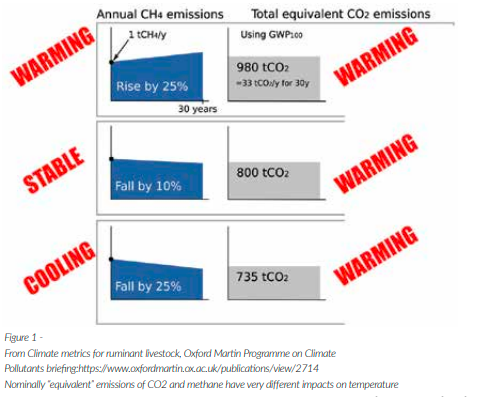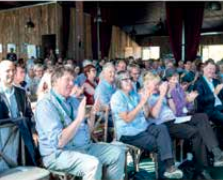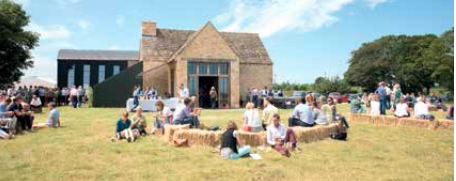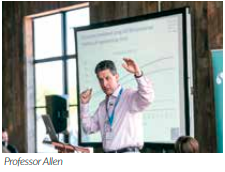Just after Groundswell in June, the Sustainable Food Trust held an event at Fir Farm titled “Farming and Climate Change: Towards net Zero Carbon Emissions.” Climate change and the ability of farming to be #TheSolution has been in the farming media a lot recently and there were a number of mainstream journalists at the event who where hopefully getting a lot of exposure to farming ability to be part of solving climate change around the world.
Opening the speaking was Charles Massy on regenerative farming. This certainly set a tone for the meeting and his thoughts were not universally appreciated by this audience. However, this was a very different audience than you see at Groundswell and so getting the message across about sustainability, climate change and soil health to a different audience can only be good. If you heard Charles speak at Groundswell you will know how passionate he is about creating balance in any environment. His book is well worth reading and is referenced in the “what to read” section later in this issue.
The event was inspired by Minette Batters pledge to make farming netzero by 2040, 10 years ahead of the government 2050 deadline. Minette herself spoke at the event. Much talk was given to livestock and pasture fed approaches to sustainability. Certainly, introducing pasture fed livestock into your rotations has been shown to be very beneficial for your soils. There was however no time given to grazing cereals, which also has potential to benefit farmers and soils. However we certainly don’t need a “Cereals Grazed Livestock Association” to join as well as pasture fed, so we aren’t sure who will promote it.
All about carbon
While the title of the event was about carbon neutral farming, one of the most interesting sections (not necessarily for arable farmers) was from Professor Myles Allen of Oxford University. The government and NFU pledge relate to both Nitrous Oxide and Methane as well as CO2. To stop the effect of climate warming by CO2 we have to simply stop producing more C02. So we need to reduce net output to zero. Tricky on a number of fronts, as we exhale it and we have a habit of driving, flying and avid consumerism. Crops, grass, hedges and trees do like to consume CO2 though in vast amounts. So farmers have a distinct advantage here.

But methane is the interesting one. To halt its effect on global warming, you don’t need to reduce methane emissions to zero. In fact a 10% reduction will do. Figure 1 shows the situation based on how a 25% increase, a 10% decease and a 25% decrease in both CO2 and Methane would effect the way they warm or cool the environment. This is great news for any livestock farmers, as the solutions to reduce methane production already exist. We already have feed additives than can reduce production. You have methane collection systems. You can then burn collected methane for energy production or even run your tractors on methane. While the costs of these are still high, they do exist and the effective “net zero” for methane is actually 90% of today’s production and can easily be achieved by the NFUs goal of 2040. Therefore if you are a livestock farmer your path to reaching net zero by 2040 doesn’t seem that complicated. That said, this move will still have a massive effect on the price on meat from UK production.

Ironically, this is the exact opposite of the picture presented by the national media, where meat is taking a bashing at the moment. Not so great for combinable crops farmers though who feed the vegan community in the UK. If you have time, please do watch the video of Professor Allen’s presentation by clicking on the QR Code below and going to 16 minutes in. The summary here does not do it justice and shows how livestock farming can also be part of the solution to global climate change.

What was missing?
The event was brilliant, any opportunity that allows you to learn is always a good use of a day. There was massive disagreement in the audience when it was suggested glyphosate should be banned. Members of the public who were attending stood up and stated that glyphosate in food was causing harm. So regardless of what we think as farmers or know from research we have read, “glyphosate” which seems to be the word the public uses for all crop protection products, is “bad”. The fact that glyphosate allows farmers to massively reduce the amount of fossil fuels they burn needs to be stressed to the public. It is a lot easier to be a sustainable farmer with glyphosate than without.

As you can imagine, we were hoping to hear lots about direct drilling, no-till farming, cover crops and everything else you read in this magazine. This was however in the great part missing. This was mostly because of the livestock and organic basis of the event. You would think these reduced tillage practices become almost essential for a conventional farmer who want to grow crops sustainably in 2040. There was also very little talk about reduction of synthetic fertilizers. A quote from an attendee at lunchtime pretty much summed it up:
“When is someone going to break the news to the average NFU member, that Minette’s pledge means they are going to have to stop ploughing and stop using synthetic fertilizers”
There is a lot to agree with in this statement and why the target of 2040? Gail Bradbrook of the Extinction rebellion movement also spoke at the event. Gail has asked that 2025 should be the deadline for net-zero emissions in terms of climate change. It’s a good question really for agriculture. If we just stopped using fert and stopped ploughing next year, this is certainly achievable. The major problems are of course that yields would be reduced and therefore we would have to buy in more food from abroad. So, while UK farmers will be doing our bit, I think consumer trends would mean that the average carbon footprint of a shopping basket would go up if we took this approach as a country. Secondly, we are not convinced that consumers want the price increase that would inevitably come with this production method. Thirdly, to be sustainable farms also have to be profitable and the above situation does not seem financially sustainable at the moment. However, maybe that’s going to change.
Carbon Farming
Along with Dieter Helm’s views on Natural capital that you can read about later in this issue. The concept of carbon farming was mentioned. Carbon currently sells for £17 a ton on the bond market. We are not totally sure where this carbon is bought from, but you can buy carbon credits to offset your carbon footprint. Elton John did just this recently to offset Prince Harry’s flight by private jet. So there is a market for it. Therefore if you farm in a carbon negative way, with limited inputs and low fuel usage and therefore have a balance of carbon in terms of your own footprint you can sell this (in theory). So if you can be 1000 tons of carbon in credit you can sell this for £17k a year. Sounds like a nice way for a farm to supplement its income and will be interesting to see how this market evolves. We would think that given this potential income stream, Direct Driller’s readers could create a very large pool of carbon to sell together to the market. Of course, you need to know your own carbon footprint and you would need to do the maths on whether reducing inputs (and therefore yield) would give you a saleable carbon footprint that outweighs the loss of yield it would cause. The future in this respect is going to be interesting.

We will let you know when the Sustainable Food Trust hold their next event as it is well worth a day of your time to understand more about our industry and how it is going to change over the next 30 years to go from a net emitter of green house gases to becoming a net sequestrator of green house gases. This is a massive opportunity for farming.

